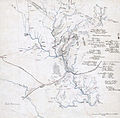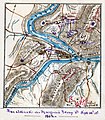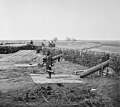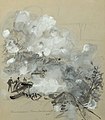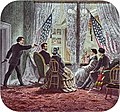Portal:American_Civil_War
Portal:American Civil War
 |
 |


The American Civil War (1861–1865) was a sectional rebellion against the United States of America by the Confederate States, formed of eleven southern states' governments which moved to secede from the Union after the 1860 election of Abraham Lincoln as President of the United States. The Union's victory was eventually achieved by leveraging advantages in population, manufacturing and logistics and through a strategic naval blockade denying the Confederacy access to the world's markets.
In many ways, the conflict's central issues – the enslavement of African Americans, the role of constitutional federal government, and the rights of states – are still not completely resolved. Not surprisingly, the Confederate army's surrender at Appomattox on April 9,1865 did little to change many Americans' attitudes toward the potential powers of central government. The passage of the Thirteenth, Fourteenth and Fifteenth amendments to the Constitution in the years immediately following the war did not change the racial prejudice prevalent among Americans of the day; and the process of Reconstruction did not heal the deeply personal wounds inflicted by four brutal years of war and more than 970,000 casualties – 3 percent of the population, including approximately 560,000 deaths. As a result, controversies affected by the war's unresolved social, political, economic and racial tensions continue to shape contemporary American thought. The causes of the war, the reasons for the outcome, and even the name of the war itself are subjects of much discussion even today. (Full article)
Atlanta was a casemate ironclad that served in the Confederate and Union Navies during the American Civil War. She was converted from a British-built blockade runner named Fingal by the Confederacy after she made one run to Savannah, Georgia. After several failed attempts to attack Union blockaders, the ship was captured by two Union monitors in 1863 when she ran aground. Atlanta was floated off, repaired, and rearmed, serving in the Union Navy for the rest of the war. She spent most of her time deployed on the James River supporting Union forces there. The ship was decommissioned in 1865 and placed in reserve. Several years after the end of the war, Atlanta was sold to Haiti, but was lost at sea in December 1869 on her delivery voyage. (Full article...)
At the outbreak of the American Civil War in April 1861, Kansas was the newest U.S. state, admitted just months earlier in January. The state had formally rejected slavery by popular vote and vowed to fight on the side of the Union, though ideological divisions with neighboring Missouri, a slave state, had led to violent conflict in previous years and persisted for the duration of the war.
While Kansas was a rural frontier state, distant from the major theaters of war, and its Unionist government was never seriously threatened by Confederate military forces, several engagements did occur within its borders, as well as countless raids and skirmishes between local irregulars, including the Lawrence Massacre by pro-Confederate guerrillas under William Quantrill in August 1863. Later the state witnessed the defeat of Confederate General Sterling Price by Union General Alfred Pleasonton at the Battle of Mine Creek, the second-largest cavalry action of the war. Additionally, some of the Union's first Black regiments would form in the state of Kansas. These contributions would inform the complicated race relations in the state during the reconstruction era (1865–1877). (Full article...)

Joseph Benson Foraker (July 5, 1846 – May 10, 1917) was an American politician of the Republican Party who served as the 37th governor of Ohio from 1886 to 1890 and as a United States senator from Ohio from 1897 until 1909.
Foraker was born in rural Ohio; he enlisted at the age of 16 in the Union Army during the American Civil War. He fought for almost three years, attaining the rank of captain. After the war, he was a member of Cornell University's first graduating class, and became a lawyer. He was elected a judge in 1879 and became well known as a political speaker. He was defeated in his first run for the governorship in 1883, but was elected two years later. As Ohio governor, he built an alliance with the Republican Party "boss" Mark Hanna, but fell out with him in 1888. Foraker was defeated for reelection in 1889, but was elected U.S. senator by the Ohio General Assembly in 1896, after an unsuccessful bid for that office in 1892. (Full article...)
- ... that at the Battle of La Haye-du-Puits in July 1944, a Confederate flag dating to the American Civil War was raised over the town?
- ... that Chinese-born Joseph Pierce enlisted as a Union Army soldier, fought at the Battle of Gettysburg during the American Civil War, and was made a corporal?
- ... that the Confederate States Navy ordered six Squib-class torpedo boats from England, but they were never delivered?
- ... that the Battle of Saint Charles featured what is known as the deadliest shot of the American Civil War?
- ... that Byron Root Pierce was Michigan's last living Civil War general?
- ... that some historians believe that Steele's Greenville expedition marked a shift in the Union's war policy?
- Attention needed
- ...to referencing and citation • ...to coverage and accuracy • ...to structure • ...to grammar • ...to supporting materials
- Popular pages
- Full list
- Cleanup needed
- The West Tennessee Raids
- Requested articles
- James Ashby (soldier) • Bluffton expedition • Benjamin D. Fearing • Charles A. Hickman • Richard Henry Jackson • James B. Speers • Charles S. Steedman • Battle of Barton's Station • Lawrence P. Graham • Thomas John Lucas • Daniel Henry Rucker • James Hughes Stokes • Frederick S. Sturmbaugh • Davis Tillson • Action at Nineveh (currently a redirect) • International response to the American Civil War • Spain and the American Civil War • Savannah Campaign Confederate order of battle • Native Americans in the American Civil War (currently disambiguation after deletion) • 1st Battalion, Mississippi Mounted Rifles (Union) • Battle of Lafayette • Requested American Civil War Medal of Honor recipients
- Expansion needed
- Battle of Boonsborough • Battle of Guard Hill • Battle of Rice's Station • Battle of Simmon's Bluff • Battle of Summit Point • Charleston Arsenal • Edenton Bell Battery • First Battle of Dalton • Blackshear Prison • Edwin Forbes • Hiram B. Granbury • Henry Thomas Harrison • Louis Hébert (colonel) • Benjamin G. Humphreys • Maynard Carbine • Hezekiah G. Spruill • Smith carbine • Edward C. Walthall • Confederate States Secretary of the Navy • Confederate States Secretary of the Treasury • David Henry Williams • Battle of Rome Cross Roads • Delaware in the American Civil War • Ironclad Board • United States Military Railroad • Kansas in the American Civil War • Rufus Daggett • Ebenezer Magoffin • Confederate Quartermaster-General's Department • First Corps, Army of Northern Virginia • Francis Laurens Vinton • Henry Maury • Other American Civil War battle stubs • Other American Civil War stubs
- Images needed
- Battle of Lone Jack • Preston Pond, Jr. • Melancthon Smith
- Merging needed
- 1st Regiment New York Mounted Rifles and 7th Regiment New York Volunteer Cavalry
- Citations needed
- 1st Alabama Cavalry Regiment (Union) • 4th Maine Battery • 33rd Ohio Infantry • 110th New York Volunteer Infantry • Battle of Hatcher's Run • Camp Dennison • Confederate colonies • CSS Resolute • Dakota War of 1862 • Florida in the American Civil War • Ethan A. Hitchcock (general) • Fort Harker (Alabama) • Gettysburg (1993 film) • Iowa in the American Civil War • Second Battle of Fort Sumter • Samuel Benton
- Translation needed
- Add an article here!
The following Wikimedia Foundation sister projects provide more on this subject:
-
Commons
Free media repository -
Wikibooks
Free textbooks and manuals -
Wikidata
Free knowledge base -
Wikinews
Free-content news -
Wikiquote
Collection of quotations -
Wikisource
Free-content library -
Wikiversity
Free learning tools -
Wikivoyage
Free travel guide -
Wiktionary
Dictionary and thesaurus
- Shortcuts to this page: Portal:ACW • P:ACW






